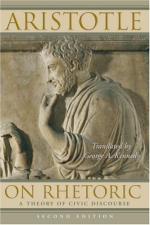
|
Rhetoric
This term was defined by Aristotle as the faculty of observe in any given case the means of persuasion.
Dialectic
This term was defined by Aristotle as the study of proper argumentation, where the chief concern was producing a sound argument.
Virtue
This is a habit or characteristic which helps a person perform good works.
Good
This is that which all things naturally seek.
Happiness
This is the end which all humans seek, and could include good friends, good children, money, power, and so on.
Justice
The chief concern of forensic rhetoric, this was defined by Aristotle as enjoying one's property as opposed to enjoying the property of others.
Enthymeme
This is a form of a logical argument that is particularly suited for rhetorical purposes because it omits the most obvious premises in order to not weigh the audience down with the formality of a syllogism.
Poetry
(read more Object Descriptions)
|
This section contains 219 words (approx. 1 page at 300 words per page) |

|




